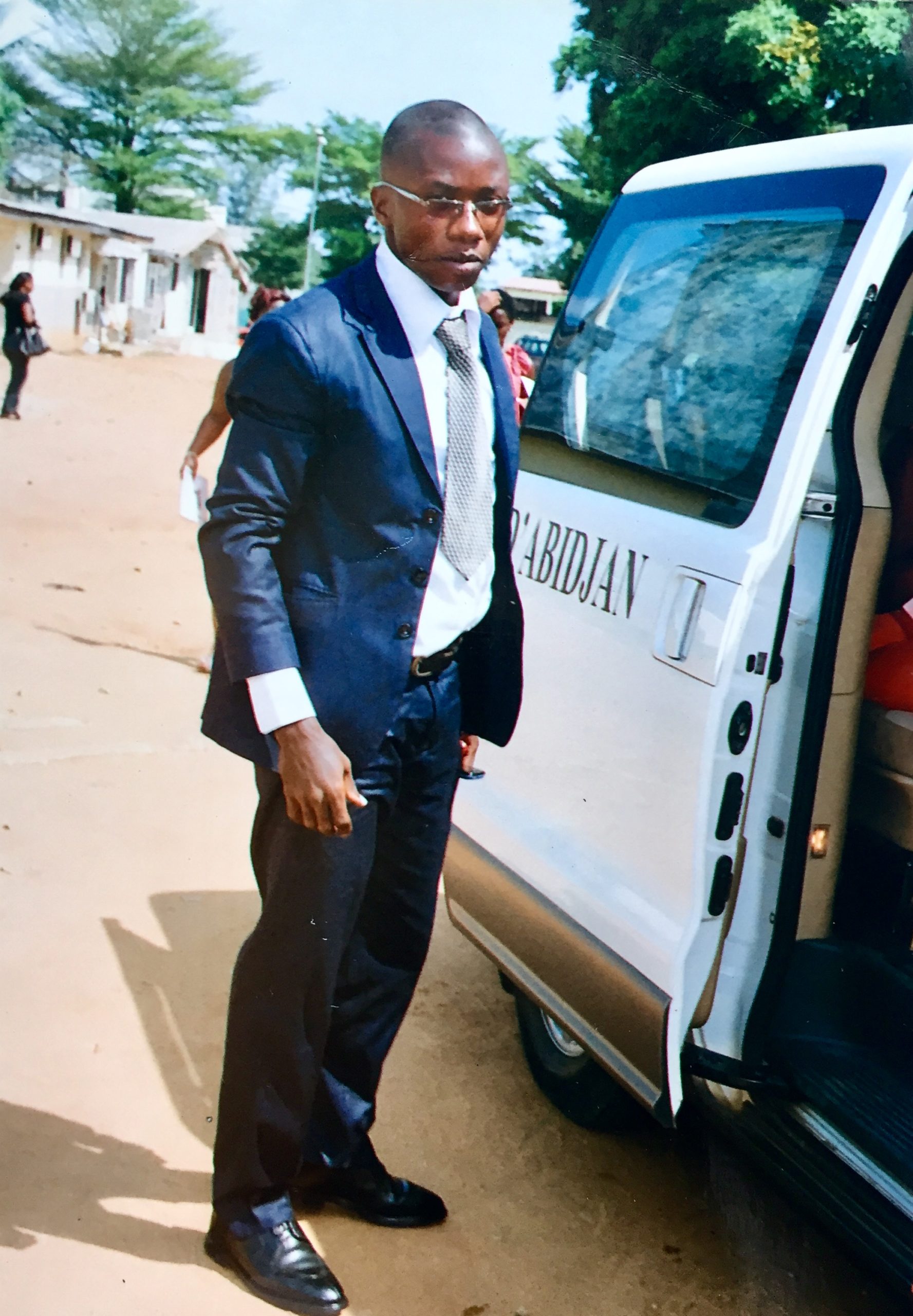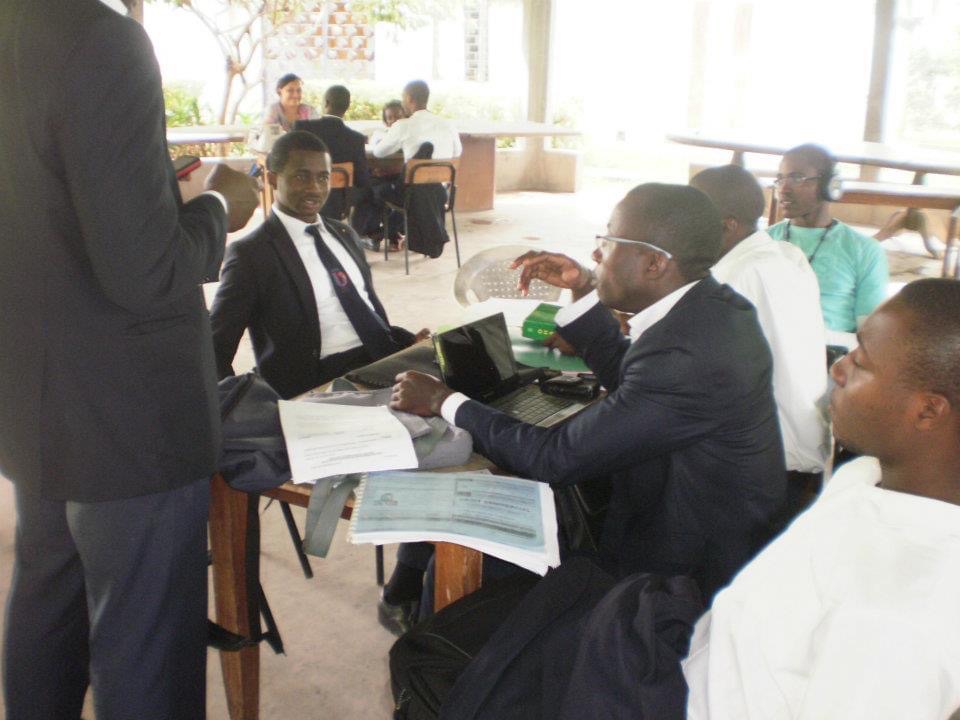(Photo above by Marco Giannavola)
After surviving a brush with death during an outbreak of violence in the Ivory Coast, Elysée Degre makes a deep determination to create real peace in the world.
I began chanting Nam-myoho-renge-kyo in 2002 at a Buddhist meeting in Divo, a city in Ivory Coast, my home country. Everyone in the Buddhist community was friendly, joyful and smiling. The hope I felt at that moment was boundless.
What drew me to Buddhism? As a child, I grew up seeing severe and frequent arguments between my parents. Whenever I witnessed my mother in tears over their fights, I felt extreme frustration. Due to this, I would become withdrawn, but if I felt wronged or saw some injustice around me, I would fight at a moment’s notice. At times, I acted violently toward my siblings.
I didn’t know how to change my ways and looked to many forms of spirituality for help, but I struggled to find the answers to many of life’s questions.

Photo courtesy of Elysée Degre
When I was 17, I met a young man who told me about Nam-myoho-renge-kyo and said that chanting these words would help me bring out the great person within. I liked the sound of that. After my first Buddhist meeting, I started to chant every morning and evening, with a determination to be in full control of my own actions and life.
My parents were against my practice and asked me many times to quit and come back to their religion, but I continued chanting. Amazingly, my attitude started to change. I no longer felt that constant anger coursing through me, and instead became more gentle, loving and accepting.
Amazingly, my attitude started to change. I no longer felt that constant anger coursing through me, and instead became more gentle, loving and accepting.
I learned to love my family more than I had before. My grades at school also improved. My family and friends started to realize these changes were due to my Buddhist practice. I was so happy the day my mother told me, “Never give up your chanting.”
This would prove to be crucial when I faced a life-or-death situation. In 2010, Ivory Coast’s presidential election ended with both candidates claiming victory, leading to civil war. I began chanting deeply for peace in my city and for the safety of my family. On May 27, 2011, armed individuals came to my older brother’s home because he had worked for the former government. There is no doubt that they planned to kill him. Fortunately, he was not home, but instead they found me and two of my brother’s friends. They pulled their guns out and yelled at us to get into their vehicle to take us away.
At that moment, I started chanting Nam-myoho-renge-kyo frantically in my heart. Suddenly I was able to move past my panic and fear and gain my composure. Right before entering the vehicle, one of the armed individuals asked my brother’s friends if they knew me, and they both said, “No.” I was released. One of the young men they took was never seen again. Had the insurgents known I was the brother of the person they were looking for, they would have surely killed me.
I later met my brother at a hotel. All night, I could not sleep. I was chanting for my family and had so much gratitude for my Buddhist practice. When the civil war ended later that year, none of my family members had been harmed.
However, the war and overall situation in the country were deeply saddening. The conflict touched everyone around me and caused a profound waste of lives. I could see clearly that so many of the youth engaged in the conflict had grown up without the education needed to see clearly how they were being manipulated by people in power.
Frustrated, angry and traumatized, I felt incapable of helping anyone. It seemed as though people learned to destroy instead of build, and that basic human rights did not exist but impunity for the elite prevailed. This situation opened my eyes to the lurking cruelty within the human soul.
Through this experience, I became more and more passionate about my mission in the world. I was determined to transform the saddest moment of my life into a great source of motivation for me to contribute to society. Instead of fighting back with violence, as I had done growing up, I wanted to fight to protect others by becoming involved in education and law.
Instead of fighting back with violence, as I had done growing up, I wanted to fight to protect others by becoming involved in education and law.
My father supported me financially to pursue my college education and insisted that I attend the best school.
In 2014, I decided to move to the United States to continue my education and pursue my dream of becoming a lawyer. Despite many challenges I have never wavered on my goal. In 2018, I earned a second master’s degree in Law and was able to intern at a law firm. While I pursue my goal of earning a doctorate degree in Law, I am also working on becoming a practicing attorney in the state of New York.
My mother’s relationship with my father changed as well, and my older brother started chanting in 2012. Buddhism has taught me to never place limits on the dreams in my heart.

Photo courtesy of Elysée Degre
I am working with friends in Ivory Coast to start programs to train young lawyers there. I want to help many people gain access to legal representation and ensure they receive real protection. I also want to establish many channels to educate and empower people to create genuine peace.
This quote by my mentor, Daisaku Ikeda, has always inspired me to keep going during tough times:
I hope no matter what happens, you will always advance with hope. Especially I hope that the more desperate your circumstances, the more you will press on with unflagging hope. Please keep challenging things with a bright and positive spirit, always taking care at the same time to safeguard your health.
Faith Into Action, p. 127
Growing up, I understood the word “fight” to mean doing violence to someone else, taking out my anger and getting what I wanted. It was physical, aggressive and negative. But today, thanks to my Buddhist practice, it has a completely different meaning. “To fight” now means to win over my weaknesses, to change myself, to chant and to act. When faced with a difficult situation, it means to not be swayed, so that I can overcome all my obstacles on the way to building a world of peace and respect.
